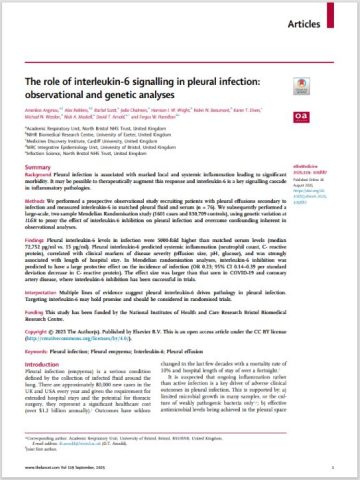Higher levels of interleukin-6 in patients with pleural infection are linked to more serious disease
- 11 September 2025
Patients with a pleural infection who have higher levels of interleukin-6 in their blood or pleural fluid are likely to be more unwell than patients with lower interleukin-6 levels, a new study shows. This suggests that treatments which inhibit the activity of interleukin-6 may be useful against pleural infection.
The study, by a team including NIHR Bristol BRC researchers and funded by the NIHR Bristol BRC, is published in The Lancet eBioMedicine.
Pleural infection – also called empyema – is a serious condition where infected fluid collects around a person’s lung. There are roughly 80,000 new cases in the UK and USA every year. Patients usually need to stay in hospital for more than two weeks, and 10% don’t survive.
Researchers studied the levels of interleukin-6 in the fluid around patients’ lungs who had a pleural infection. Interleukin-6 is a protein in the body, involved in fighting infection. They found those with a higher level of interleukin-6 in their lung fluid had more inflammation throughout their body, and more serious disease. Patients with higher interleukin-6 levels spent longer in hospital.
To check that high interleukin-6 levels cause patients’ pleural infection to get worse, rather than being related to their pleural infection in some other way, the researchers used a technique called Mendelian randomisation, which was originally developed in Bristol.
They studied DNA from groups of people with and without pleural infection and looked for genetic changes that are known to influence the effect of interleukin-6 on inflammation. They then investigated whether people in the sample groups with these genetic changes suffered from a pleural infection.
This showed that, when interleukin-6 activity was lower, people were less likely to have pleural empyema.
Previous studies have shown that inhibiting the activity of interleukin-6 reduces the chance of developing COVID-19 and coronary artery disease. This study found that inhibiting the activity of interleukin-6 reduces the chance of pleural infection by even more than it reduces the chances of these other diseases.
Based on their findings, the researchers suggest performing a study to find out whether treatments targeting interleukin-6 can help pleural empyema patients.
Dr Fergus Hamilton, NIHR Clinical Lecturer at the University of Bristol and study author, said:
“Pleural disease has a major impact on health.
“Our research has shown that patients with pleural disease may benefit from drugs which suppress interleukin-6. This finding could improve future care for patients with this serious disease.”
